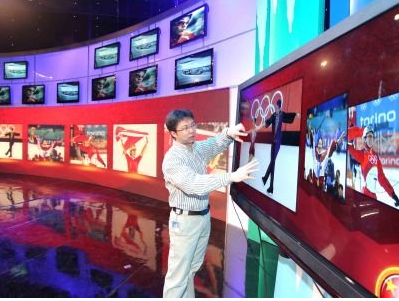
Microsoft's Surface tablet is, for now, aptly named. We know what the product looks like, but don't know how it will perform, or sell, until it gets into consumers' hands. Reviewers can only debate the features (USB port; kickstand; thin keyboard; whoop-de-doo) and analysts will resort to new forms of bet-hedging ("execution will be key").
眼下來(lái)看,微軟(Microsoft)Surface平板電腦的名字很貼切。我們知道產(chǎn)品長(zhǎng)什么樣,但在它到消費(fèi)者手中之前,我們不知道它的性能或銷(xiāo)量如何。評(píng)論者只能辯論各種功能(USB接口;支架;薄鍵盤(pán);諸如此類(lèi)),而分析師將求助于可進(jìn)可退的新套話(huà)("執(zhí)行將是關(guān)鍵")。
And the tablet has to perform beautifully because of an ugly catch 22: mobile devices become popular with consumers largely because of the available applications, but app developers only work on devices that are popular with consumers. The fact that it will run Microsoft Office's software suite, with which cubicle dwellers worldwide are sentenced to spend their days, does not mean Surface can crack this problem.
這款平板電腦必須有出色的表現(xiàn),原因在于一對(duì)可惡的矛盾:一方面,移動(dòng)設(shè)備能否受到消費(fèi)者歡迎,在很大程度上要看可獲得的應(yīng)用程序有多少;另一方面,應(yīng)用開(kāi)發(fā)者只針對(duì)人氣較高的設(shè)備開(kāi)發(fā)應(yīng)用。雖然Surface將運(yùn)行全世界白領(lǐng)員工不得不使用的微軟Office套裝軟件,但這并不意味著這款平板電腦能夠解決上述矛盾。
Pricing will also be crucial. Microsoft's Lumia smartphone, released with Nokia, proved that a solid product with differentiating features can still struggle with consumers, especially if it is too dear. Microsoft, because it is making the Surface under its own brand, will have complete control of price. So far, it has said only that prices will be "competitive" with existing products. Why not discount aggressively, to break open the market? Assuming a $400 cost for the lower-end Windows RT version, the company could sell 10m of them at $300 (a big discount over the cheapest iPad) while sacrificing all of 4 per cent of pre-tax income.
定價(jià)也將很關(guān)鍵。微軟與諾基亞(Nokia)合作打造的Lumia智能手機(jī)表明,有著與眾不同功能的優(yōu)秀產(chǎn)品,仍有可能難以獲得消費(fèi)者的青睞,尤其是如果這款產(chǎn)品很貴的話(huà)。由于微軟借助自己的品牌推出Surface,因此該公司對(duì)定價(jià)有著完全的控制權(quán)。迄今微軟僅表示,Surface的價(jià)格與現(xiàn)有產(chǎn)品相比將"具有競(jìng)爭(zhēng)力"。為什么不推出咄咄逼人的折扣來(lái)打開(kāi)市場(chǎng)呢?假設(shè)低端Windows RT版本的成本是400美元,那么微軟能夠以300美元(比最便宜的iPad還便宜很多)的價(jià)格銷(xiāo)售1000萬(wàn)臺(tái),同時(shí)犧牲全部4%的稅前利潤(rùn)。
Consumers tend to equate price and value, and Microsoft has a fledgling brand to protect. More important, Microsoft must consider the global PC makers, from Hewlett-Packardto Lenovo. They will not make Windows tablets if they are competing against a subsidised Surface. Microsoft will have to think carefully before alienating the partners who have helped make their software franchise one of the most profitable businesses of all time.
消費(fèi)者往往把價(jià)格和價(jià)值等同起來(lái),而微軟也需要保護(hù)初生的Surface品牌。更重要的是,微軟必須考慮從惠普(Hewlett-Packard)到聯(lián)想(Lenovo)的全球個(gè)人電腦(PC)制造商。若要與得到補(bǔ)貼的Surface展開(kāi)競(jìng)爭(zhēng),他們將不會(huì)生產(chǎn)Windows平板電腦。在疏遠(yuǎn)那些讓微軟軟件成為史上盈利最豐厚行業(yè)之一的合作伙伴之前,微軟需要三思而行。












